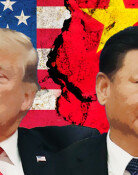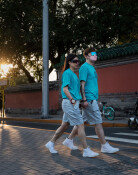Hurum: "Aiming to Become a Global K-Functional Food Brand"
Hurum: "Aiming to Become a Global K-Functional Food Brand"
Posted December. 30, 2024 13:45,
Updated December. 30, 2024 13:46
The global wave of K-culture is expanding, extending from K-pop to encompass ▲K-culture, ▲K-beauty, ▲K-food, and ▲K-bio. As a result, domestic companies are accelerating their overseas ventures, including those in the functionals food market. According to the market research firm Fortune Business Insights, the global functional foods market is projected to reach a value of $457.35 billion in 2024, with the Asia-Pacific and US markets accounting for nearly half of this number. Success in this vast market requires ▲swift market responsiveness, ▲differentiated products, and ▲strong technical capabilities.
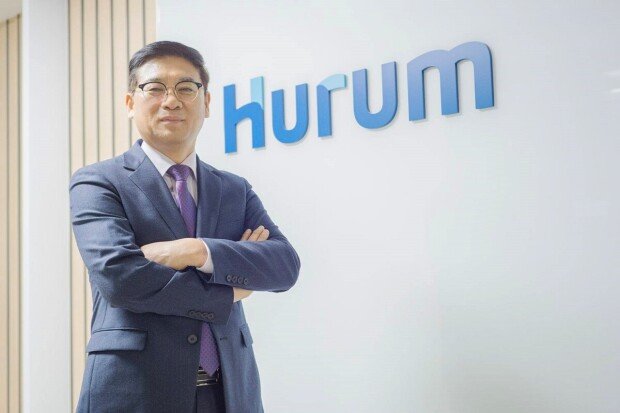 Jinseok Kim, CEO of Hurum / Source: IT DongA
Jinseok Kim, CEO of Hurum / Source: IT DongA
Hurum is actively engaged in the manufacturing and distribution of a range of functional foods, including red ginseng and probiotics, as well as distributing exclusive ingredients for cafes. Beyond its flagship functional foods brand, Hurum, the company operates through a wide-ranging portfolio of brands such as ▲Hurum Science, ▲Hurum EXPERT, ▲Yogurberry, ▲V:nergy, ▲TrueLAC, and ▲Imyo. In addition, the company collaborates with affiliated brands like ▲Jungwonsam and ▲YU to reach consumers through various channels. What stands out is Hurum's proactive approach to adapting to rapidly changing markets through bold investments as well as mergers and acquisitions (M&A).
Bold Investments and M&A to Prepare for the Future
"Since our incorporation in 2005, we’ve grown rapidly through our distribution and franchise businesses. In 2012, we introduced a yogurt maker that doesn’t require electricity, which became an immensely popular item, selling over 2 million units on home shopping channels. However, we realized the necessity to find our next growth engine, which led us to acquire Hurum in 2015," explained Jinseok Kim, CEO of Hurum.
Hurum's approach to managing its diverse brand portfolio is reflected by its flexibility in responding to the market demands. Kim's philosophy is centered on maximizing the company’s capabilities in ▲research, ▲manufacturing, ▲distribution, and ▲marketing to find new growth engines.
Hurum has introduced a variety of products to the functional foods market. Early successes included hit products like ▲Pu’er Tea Diet and ▲Cissus Diet. As the functional foods market began to grow rapidly, Hurum took advantage of this momentum to establish a growth trajectory. The company then launched brands like TrueLAC, focusing on digestive health, and V:nergy, a product aimed at alleviating fatigue and boosting vitality. It also expanded its initial product line, Yogurberry, by introducing new yogurt starters such as ▲Plain, ▲Caspian, and ▲Greek.
However, as more companies entered the functional foods market, the competition intensified. In response, Kim turned his attention to the next strategy for sustainable growth, identifying the medical device sector as a promising opportunity.”
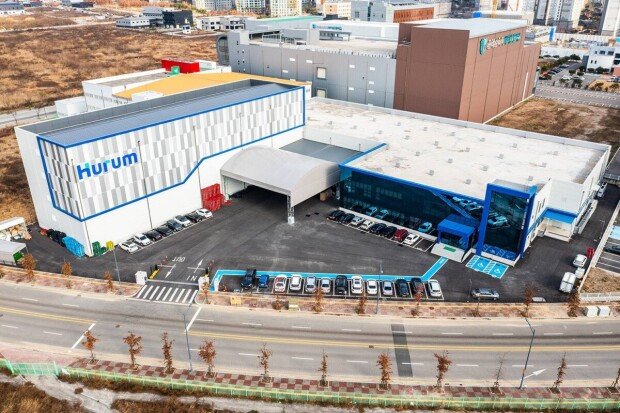 Hurum's R&D and Logistics Center in Osong, Cheongju / Source: Hurum
Hurum's R&D and Logistics Center in Osong, Cheongju / Source: Hurum
"In my view, Korea’s medical device market has a strong level of global competitiveness, especially in regard to the cost-effectiveness of Botox fillers. Sensing the market's growth potential, we acquired YU, a company that specializes in fillers, in 2022," Kim noted.
To stay competitive, Hurum emphasizes not only quality but also price competitiveness. The company has built a self-reliant value chain system, including an ▲R&D center, ▲manufacturing facilities, and ▲logistics operations, with a focus on combining external ideas with its internal R&D capabilities through Connect & Development (C&D). This has resulted in assets such as the ▲Osong R&D and Logistics Center for functional materials in Cheongju and ▲a medical device and filler factory in Hwaseong, Gyeonggi.
The Next K-Wave: Red Ginseng
Another promising avenue for Hurum is red ginseng, which CEO Kim sees as a perfect candidate for global expansion.
"K-products are gaining popularity worldwide, alongside the K-wave. I believe that red ginseng is the next product in line. We’re already seeing an increasing demand for red ginseng in Southeast Asia and are preparing to enter the US market," Kim said.
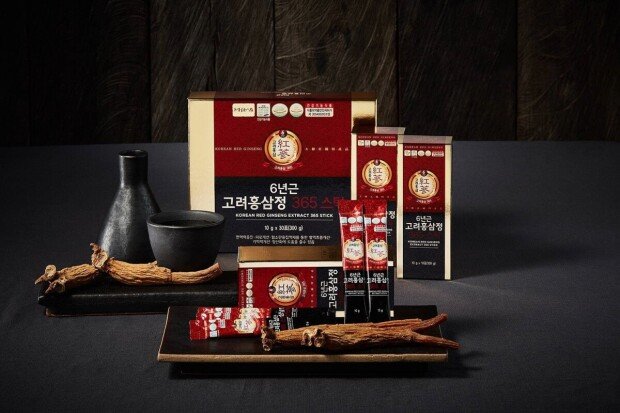 Hurum aims to promote red ginseng through the Jungwonsam brand / Source: Hurum
Hurum aims to promote red ginseng through the Jungwonsam brand / Source: Hurum
Hurum acquired Nature Garden in 2023 in order to bolster its red ginseng capabilities. Through Nature Garden's Jungwonsam brand, is Hurum planning to strengthen its domestic and international market presence. The company has also equipped its newly completed Osong facility with red ginseng production lines, to meet the expanding market demands.
In Korea, red ginseng is often perceived as a gift item for holidays, but Hurum is reimagining this perception. Jungwonsam has redesigned its packaging to resemble single-serving coffee mix sticks, making it more accessible for consumption. This approach has boosted its sales on platforms like Coupang and other e-commerce sites.
Hurum is also tailoring its products for the overseas market through active R&D, with the understanding that local consumer preferences are the key to success. "We need to integrate our products seamlessly into each culture. There is a broad demand, but it’s crucial to respond in a localized manner. Identifying and addressing our consumer needs with precision is the key to success," Kim explained. "We are aiming to utilize various platforms to showcase the excellence of our red ginseng and establish a next-generation K-functional food market."
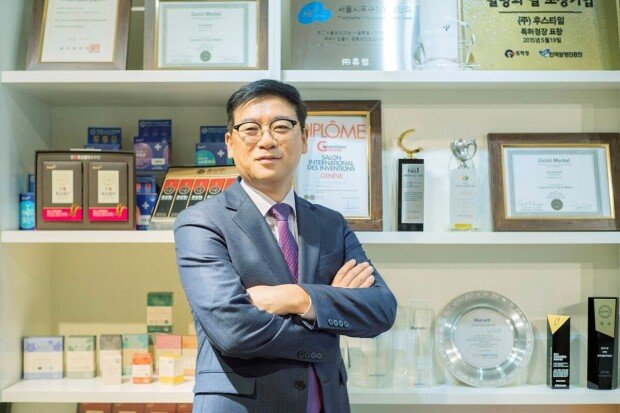 Jinseok Kim, CEO of Hurum / Source: IT DongA
Jinseok Kim, CEO of Hurum / Source: IT DongA
Hurum’s progress in the global market has been significantly supported by the Seoul Business Agency (SBA). The agency provided tailored solutions to help Hurum enhance its global business capabilities and to secure export channels. By addressing and resolving the common challenges faced by SMEs entering overseas markets, the SBA’s practical assistance has been instrumental in Hurum’s growth.
Looking ahead, Hurum is planning to continue investing in R&D and building global platforms, to accelerate its international expansion. With its commitment to fostering a culture of innovation and collaboration, Hurum aims to become a company that embodies the values of health and well-being.
"Our vision is to be a leading global company that delivers health and happiness," Kim stated. "Amid the changing consumer trends and the global health market landscape, we will dedicate ourselves to improving the quality of life of our consumers through a differentiated range of products."
by Hyung-seok Kang (redbk@itdonga.com)

Hurum is actively engaged in the manufacturing and distribution of a range of functional foods, including red ginseng and probiotics, as well as distributing exclusive ingredients for cafes. Beyond its flagship functional foods brand, Hurum, the company operates through a wide-ranging portfolio of brands such as ▲Hurum Science, ▲Hurum EXPERT, ▲Yogurberry, ▲V:nergy, ▲TrueLAC, and ▲Imyo. In addition, the company collaborates with affiliated brands like ▲Jungwonsam and ▲YU to reach consumers through various channels. What stands out is Hurum's proactive approach to adapting to rapidly changing markets through bold investments as well as mergers and acquisitions (M&A).
Bold Investments and M&A to Prepare for the Future
"Since our incorporation in 2005, we’ve grown rapidly through our distribution and franchise businesses. In 2012, we introduced a yogurt maker that doesn’t require electricity, which became an immensely popular item, selling over 2 million units on home shopping channels. However, we realized the necessity to find our next growth engine, which led us to acquire Hurum in 2015," explained Jinseok Kim, CEO of Hurum.
Hurum's approach to managing its diverse brand portfolio is reflected by its flexibility in responding to the market demands. Kim's philosophy is centered on maximizing the company’s capabilities in ▲research, ▲manufacturing, ▲distribution, and ▲marketing to find new growth engines.
Hurum has introduced a variety of products to the functional foods market. Early successes included hit products like ▲Pu’er Tea Diet and ▲Cissus Diet. As the functional foods market began to grow rapidly, Hurum took advantage of this momentum to establish a growth trajectory. The company then launched brands like TrueLAC, focusing on digestive health, and V:nergy, a product aimed at alleviating fatigue and boosting vitality. It also expanded its initial product line, Yogurberry, by introducing new yogurt starters such as ▲Plain, ▲Caspian, and ▲Greek.
However, as more companies entered the functional foods market, the competition intensified. In response, Kim turned his attention to the next strategy for sustainable growth, identifying the medical device sector as a promising opportunity.”

"In my view, Korea’s medical device market has a strong level of global competitiveness, especially in regard to the cost-effectiveness of Botox fillers. Sensing the market's growth potential, we acquired YU, a company that specializes in fillers, in 2022," Kim noted.
To stay competitive, Hurum emphasizes not only quality but also price competitiveness. The company has built a self-reliant value chain system, including an ▲R&D center, ▲manufacturing facilities, and ▲logistics operations, with a focus on combining external ideas with its internal R&D capabilities through Connect & Development (C&D). This has resulted in assets such as the ▲Osong R&D and Logistics Center for functional materials in Cheongju and ▲a medical device and filler factory in Hwaseong, Gyeonggi.
The Next K-Wave: Red Ginseng
Another promising avenue for Hurum is red ginseng, which CEO Kim sees as a perfect candidate for global expansion.
"K-products are gaining popularity worldwide, alongside the K-wave. I believe that red ginseng is the next product in line. We’re already seeing an increasing demand for red ginseng in Southeast Asia and are preparing to enter the US market," Kim said.

Hurum acquired Nature Garden in 2023 in order to bolster its red ginseng capabilities. Through Nature Garden's Jungwonsam brand, is Hurum planning to strengthen its domestic and international market presence. The company has also equipped its newly completed Osong facility with red ginseng production lines, to meet the expanding market demands.
In Korea, red ginseng is often perceived as a gift item for holidays, but Hurum is reimagining this perception. Jungwonsam has redesigned its packaging to resemble single-serving coffee mix sticks, making it more accessible for consumption. This approach has boosted its sales on platforms like Coupang and other e-commerce sites.
Hurum is also tailoring its products for the overseas market through active R&D, with the understanding that local consumer preferences are the key to success. "We need to integrate our products seamlessly into each culture. There is a broad demand, but it’s crucial to respond in a localized manner. Identifying and addressing our consumer needs with precision is the key to success," Kim explained. "We are aiming to utilize various platforms to showcase the excellence of our red ginseng and establish a next-generation K-functional food market."

Hurum’s progress in the global market has been significantly supported by the Seoul Business Agency (SBA). The agency provided tailored solutions to help Hurum enhance its global business capabilities and to secure export channels. By addressing and resolving the common challenges faced by SMEs entering overseas markets, the SBA’s practical assistance has been instrumental in Hurum’s growth.
Looking ahead, Hurum is planning to continue investing in R&D and building global platforms, to accelerate its international expansion. With its commitment to fostering a culture of innovation and collaboration, Hurum aims to become a company that embodies the values of health and well-being.
"Our vision is to be a leading global company that delivers health and happiness," Kim stated. "Amid the changing consumer trends and the global health market landscape, we will dedicate ourselves to improving the quality of life of our consumers through a differentiated range of products."
by Hyung-seok Kang (redbk@itdonga.com)
Headline News
- Acting president fills key court vacancies, opposition cries foul
- Graham Allison raises alarm over 'Thucydides Trap' as U.S.-China tensions rise"
- Samsung posts 6.6 trillion won operating profit in Q1
- Chinese teens caught filming Air Force jets without authorization
- S. Korea’s early presidential election set for June 3



